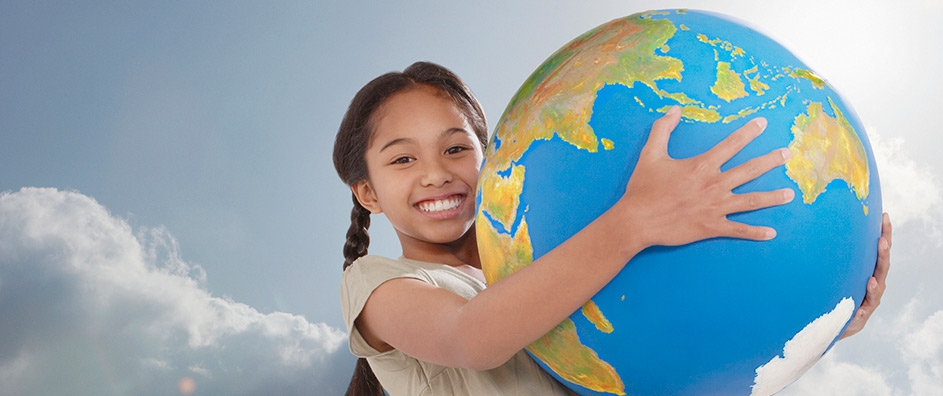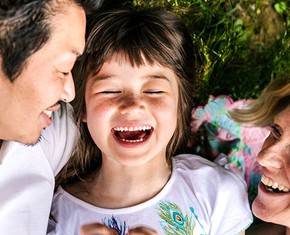The views expressed in our content reflect individual perspectives and do not represent the authoritative views of the Baha'i Faith.
We all try our best to take good care of our children, so they grow up physically healthy, spiritually-minded, and guided by good ethical values.
We also make much effort to provide them with a good education so that they will be able to earn a living and serve the common good.
But let’s step back and think for a moment: All of these things presume that our children will have a future. What will the future of our children look like? Will they be able to find meaningful work that allows them to develop their capacities, serve the common good, and earn enough money to satisfy their and their families’ needs? Will they be able to enjoy art and music and get together to discuss spiritual matters? Will they be able to provide their children with a quality education? Will they even have sufficient food?
What’s the best thing we can do today for our children’s future, so that we can look forward confidently, and positively answer these questions?
First, we must educate ourselves about the reality of the world we live in right now. We must learn about the many changes happening in society and in the environment. Then we must find ways to help society move in a direction that will assure our children a decent future life. A fancy phrase exists for that concept: sustainable development. It means any ongoing development that can be continually sustained into the future.
Much of the economic development we have seen in the past 100 years has brought numerous blessings to many people—but not to all. This development, we’re learning, is no longer sustainable. Let’s illustrate this with just one example: car ownership. Car exhausts emit many toxins, and people in big cities around the world are already now getting sick and dying prematurely because of them. Moreover, the cars’ carbon emissions are a major contributor to global warming, which causes harmful changes in the Earth’s climate system.

The problem is not only with our cars; we have transgressed the natural limits of our planet in many ways. The Earth no longer has the capability of absorbing the waste we humans produce, or to replenish the resources we extract from it. The environmental crisis, especially climate change, seriously threatens the future of our children.
At the same time we must acknowledge that the benefits of material civilization have not reached all people. While the proportion of people living in extreme poverty has declined, almost a billion people go hungry each day. Too many children die from preventable causes, including malnourishment. Hundreds of millions don’t have access to clean and safe drinking water, and the majority of people in Africa don’t have access to electricity yet.
These poor populations should have the right to develop, too. That’s why wealthy developed countries must assist poor countries with clean technology development. This is only fair: wealthy countries used natural resources from poor countries for their own development in many instances, and polluted the global atmosphere, which resulted in climate change. Poor people are suffering first from its devastating impacts.
Applying the spiritual principle of fairness or justice should be sufficient cause for such assistance. An additional and also important reason is that the future of our children depends on environmentally sustainable development. Our children and their children will need a healthy Earth that can still provide them with the life support systems that we have enjoyed in the past. They will need clean water and a climate that will allow them to grow food. With the current trajectory of human economic activities, even if the nations implement the reductions of emissions promised in the 2015 Paris Agreement, these prospects do not look promising.
The wealthy countries of the world also need development. They need clean energy development and a change to sustainable agricultural practices that will not destroy the soil. They need to find ways to reuse everything they throw away. Last, but not least, they must learn to be “content with little” as Abdu’l-Baha said a century ago. We must drastically reduce our consumption of meat, especially beef; acquire much less stuff; and be mindful in avoiding waste and conspicuous consumption. We can also teach our children these important concepts, so they will become part of building a sustainable future themselves.
Much social development needs to happen as well. The gap between rich and poor is not only increasing between countries, but also within countries. The equality of women must progress, and all people should become empowered to play an active role in the improvement of their society. Most important is that we learn to work together in unity. That’s one more reason why we must address the problems of poverty and climate change—because they are both issues of justice. There will be no unity and no peace without justice. Baha’u’llah said:
The light of men is Justice. Quench it not with the contrary winds of oppression and tyranny. The purpose of justice is the appearance of unity among men. – Tablets of Baha’u’llah, pp. 66-67.
Working for social justice and unity is an essential part of sustainable development. Our children’s lives will not only depend on a healthy environment, but also on a just and peaceful society.
Baha’is support sustainable development all around the world. Educational activities such as children and youth classes, as well as adult study classes, aim to lay the spiritual foundation for positive change, and to empower people to tackle their local challenges by helping develop their capacity for service. On the societal level, Baha’is build Houses of Worship that not only serve as the focal point of spiritual communion, but also the foundation for future social service and educational institutions.
As you see, sustainable development is a complex issue. You can learn more about it in the Wilmette Institute online course “Sustainable Development and the Prosperity of Humankind”. The course will discuss the economic, social and environmental aspects of sustainable development, present the United Nations’ Sustainable Development Goals, and explore the profound implications of the Baha’i teachings for sustainability. Baha’is believe that the Baha’i teachings provide humankind with the guidance needed to make sure that our children will have a good future, which is, according to Baha’u’llah, our mandate:
All men have been created to carry forward an ever-advancing civilization. – Gleanings from the Writings of Baha’u’llah, p. 215.
While written from a Baha’i perspective, the Wilmette Institute course on Sustainable Development is interfaith in tone. Everyone is welcome. Scholarships are available for those who need them. The seven-week course begins on 10 September 2017. You can study the written and video materials and participate in the discussions in the online course forum as fits your personal schedule. For more information, and to register, click here.
















Comments
Sign in or create an account
Continue with Googleor